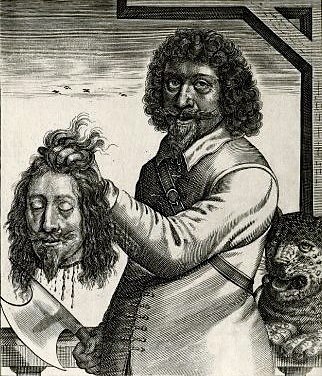
detail from ’t Moordadigh Trevrtoneel (The murderous tragedy – 1649), an anonymous Dutch broadside on the beheading of Charles I – Thomas Fairfax (1612-71), Parliamentary commander-in-chief during the English Civil War, is standing beneath a gallows holding the severed head of Charles I in his left hand, an axe in his right hand; behind him is a leopard. — image: Wikimedia Commons
The phrase King Charles’s head denotes any recurrent and irrational obsession.
It refers to The Personal History of David Copperfield (London, 1850), by the English novelist Charles Dickens (1812-70), in which Mr. Dick, whose real name is Richard Babley, is a mentally fragile elderly gentleman whose sole occupation, the self-imposed task of writing his autobiography, is regularly defeated by the intrusive image of King Charles the First’s head.
In the following passage, David has just met Mr. Dick, who lives with Miss Betsey Trotwood, David’s great-aunt, in her cottage:
“Do you recollect the date,” said Mr. Dick, looking earnestly at me, and taking up his pen to note it down, “when King Charles the First had his head cut off?”
I said I believed it happened in the year sixteen hundred and forty-nine.
“Well,” returned Mr. Dick, scratching his ear with his pen, and looking dubiously at me. “So the books say; but I don’t see how that can be. Because, if it was so long ago, how could the people about him have made that mistake of putting some of the trouble out of his head, after it was taken off, into mine?”
In The Memorializing of Mr. Dick, published in Nineteenth-Century Fiction (University of California Press – September 1969), Stanley Tick reviews some of the details of Mr. Dick’s history:
When his favorite and protective sister married, the ne’er-do-well husband mistreated both sister and dependent brother. Specifically, Mr. Dick was terrified by the threat of being certified. As a result of his dreadful submission, Mr. Dick suffered a long illness—followed by a traumatic repression. He cannot now control his memory; he is unable to recall and express any of these experiences. Yet he is driven continually to try. Betsey Trotwood’s explanation (to David) makes it clear that when Mr. Dick recovered from his fever, a psychological defence in the form of a curious repression had taken root: the mind-blocking obsession of King Charles the First’s head now invades Mr. Dick’s memory as he sits at his writing-table trying to recapture the past.
The following dialogue between David and Miss Betsey takes place after she has told him that she took in Mr. Dick after he was mistreated:
“Did he say anything to you about King Charles the First, child?”
“Yes, aunt.”
“Ah!” said my aunt, rubbing her nose as if she were a little vexed. “That’s his allegorical way of expressing it. He connects his illness with great disturbance and agitation, naturally, and that’s the figure, or the simile, or whatever it’s called, which he chooses to use. And why shouldn’t he, if he thinks proper!”
I said: “Certainly, aunt.”
“It’s not a business-like way of speaking,” said my aunt, “nor a worldly way. I am aware of that; and that’s the reason why I insist upon it, that there shan’t be a word about it in his Memorial.”
“Is it a Memorial about his own history that he is writing, aunt?”
“Yes, child,” said my aunt, rubbing her nose again. “He is memorialising the Lord Chancellor, or the Lord Somebody or other—one of those people, at all events, who are paid to be memorialised—about his affairs. I suppose it will go in, one of these days. He hasn’t been able to draw it up yet, without introducing that mode of expressing himself; but it don’t signify; it keeps him employed.”
In the above-mentioned article, Stanley Tick explains “the most important “truth” informing the metaphor of Mr. Dick”:
On the one hand, the indignities he has suffered long in the past demand persistently to be expressed; his repeated efforts to write them out, to “memorialize” them, represent the reaction of an outraged goodness. On the other hand, Mr. Dick’s innate gentleness and now precariously balanced faculties will not permit renewed confrontation with past terrors.
An early use of the phrase is found in a letter written from Rome by ‘Anglicus’, published in The Standard (London) on 29th August 1865; according to the author, the Roman correspondents of the liberal press have set up a theory “to the effect that the brigandage in the kingdom of Naples has its source, its harbourage, its paymasters, and its organisers in Rome”:
This theory is the idée fixé of Whig newsmongers; it is the providence of their correspondents, especially in the summer months; it is the “enormous gooseberry” of their dead season; the King Charles’s head they cannot keep out of this memorial!
In GOP now the party of workers, published in The Spectrum & Daily News (Saint George, Utah) of 19th December 2016, Rich Lowry wrote:
In the course of a couple of tweets, Donald Trump may have ended the image of the GOP as the party of Corporate America. After striking a Carrier deal to preserve about 800 jobs, the president-elect slapped the Indiana company Rexnord on Twitter for “rather viciously firing” its workers and then went after Boeing for ripping off the public on a $3 billion Air Force One deal.
Just like that, and in less than 280 characters, Trump had established more distance from big business than the GOP had in a generation. […]
Gone is the obsession with the federal deficit that has long been the King Charles’ head of Republican policymakers.
